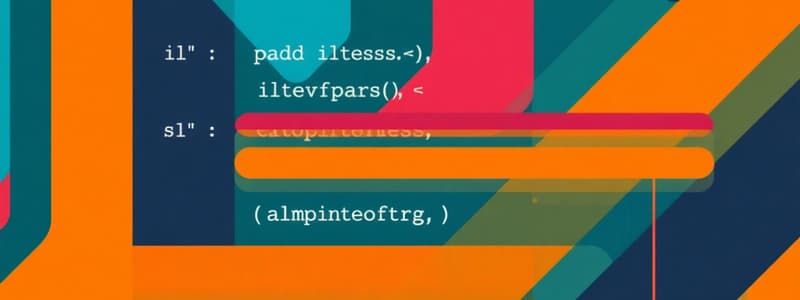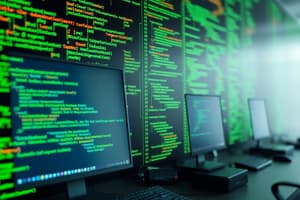Podcast
Questions and Answers
What is one of the key features of C programming that allows programs to run on multiple platforms?
What is one of the key features of C programming that allows programs to run on multiple platforms?
- Portability (correct)
- Rich Library Support
- Structured Language
- Efficiency
What is the correct syntax for the main function in a C program?
What is the correct syntax for the main function in a C program?
- main() { return 0; }
- int main() { return 0; } (correct)
- int main { return 0; }
- void main() { return; }
Which of the following is a loop structure in C programming?
Which of the following is a loop structure in C programming?
- return
- switch
- if
- while (correct)
What is the purpose of using pointers in C programming?
What is the purpose of using pointers in C programming?
Which function is used for dynamic memory allocation in C?
Which function is used for dynamic memory allocation in C?
Which of the following correctly declares a string in C?
Which of the following correctly declares a string in C?
Which preprocessor directive is used to include header files in a C program?
Which preprocessor directive is used to include header files in a C program?
How do you handle errors in C programming?
How do you handle errors in C programming?
Flashcards are hidden until you start studying
Study Notes
Overview of C Programming
- C is a high-level programming language developed in the early 1970s.
- It was created by Dennis Ritchie at Bell Labs for system programming and software development.
Key Features
- Portability: Programs can run on multiple platforms with little or no modification.
- Efficiency: Provides low-level access to memory, making it suitable for system-level programs.
- Structured Language: Supports modular programming with functions and data structures.
- Rich Library Support: Extensive standard libraries for input/output, string manipulation, and mathematical computations.
Basic Syntax
- Comments: Single-line (
//) and multi-line (/* */). - Main Function:
- Entry point of the program:
int main() { /* code */ return 0; }
- Entry point of the program:
- Data Types:
- Basic:
int,float,double,char - Derived: Arrays, Pointers, Structures, Unions
- Enumeration:
enum
- Basic:
Control Structures
- Conditional Statements:
if,else if,elseswitchstatement
- Loops:
for,while,do while
Functions
- Definition: A block of code for reusable tasks.
- Declaration:
return_type function_name(parameter_list); - Example:
int add(int a, int b) { return a + b; }
Arrays and Strings
- Arrays: Collection of elements of the same type.
- Declaration:
data_type array_name[size];
- Declaration:
- Strings: Arrays of characters ending with a null character (
\0).- Example:
char str[10];
- Example:
Pointers
- Variables that store memory addresses, enhancing direct memory management.
- Declared using
*:int *ptr; - Important operations: dereferencing (
*ptr), and address-of (&var).
Memory Management
- Dynamic memory allocation using:
malloc(size): allocates memory.calloc(num, size): allocates zero-initialized memory.free(ptr): deallocates memory.
Preprocessor Directives
- Commands that are processed before compilation:
#include: includes header files#define: defines macros- Conditional compilation with
#ifdef,#endif
Input and Output
- Standard Input/Output:
printf(): used for output.scanf(): used for input.
- Example:
printf("Enter number: "); scanf("%d", &num);
Error Handling
- Use of error codes, conditional statements, and return values to handle exceptions.
- Common include
<errno.h>for error reporting.
File Handling
- File operations using:
fopen(): to open a file.fclose(): to close a file.fread(),fwrite(),fprintf(),fscanf()for reading/writing.
Compiling and Running
- Compilation using a compiler:
gcc file.c -o output - Running the program:
./output
Best Practices
- Use descriptive variable names.
- Comment code for clarity.
- Keep functions concise and focused.
- Always free dynamically allocated memory.
Common Use Cases
- System programming (operating systems, embedded systems).
- Application development (software tools, games).
Conclusion
- C remains a fundamental language due to its efficiency, control over system resources, and foundational role in the development of other programming languages.
C Programming Language Overview
- Created by Dennis Ritchie at Bell Labs in the early 1970s.
- Designed for system programming and software development.
Key Features of C
- Highly portable: runs on various platforms with minimal changes.
- Efficient: offers low-level memory access, ideal for system-level tasks.
- Structured: supports modular programming using functions and data structures.
- Rich standard library: provides extensive support for I/O, string manipulation, and math.
Basic C Syntax
- Comments:
//for single-line,/* */for multi-line. main()function: program's entry point (int main() { return 0; }).- Data types: basic (
int,float,double,char), derived (arrays, pointers, structures, unions), and enumerated (enum).
Control Structures in C
- Conditional statements:
if,else if,else, andswitch. - Loops:
for,while,do-while.
Functions in C
- Reusable blocks of code.
- Declared as
return_type function_name(parameter_list);. - Example:
int add(int a, int b) { return a + b; }
Arrays and Strings in C
- Arrays: collections of same-type elements; declared as
data_type array_name[size];. - Strings: arrays of characters ending with
\0(null character).
Pointers in C
- Variables storing memory addresses.
- Declared using
*:int *ptr;. - Operations: dereferencing (
*ptr) and address-of (&var).
Memory Management in C
- Dynamic allocation:
malloc(size),calloc(num, size). - Deallocation:
free(ptr).
Preprocessor Directives in C
- Commands processed before compilation.
#include: includes header files.#define: defines macros.- Conditional compilation:
#ifdef,#endif.
Input/Output Operations in C
printf(): for output.scanf(): for input.- Example:
printf("Enter number: "); scanf("%d", &num);
Error Handling in C
- Uses error codes, conditional statements, and return values.
- Often utilizes
errno.hfor error reporting.
- Often utilizes
File Handling in C
fopen(): opens a file.fclose(): closes a file.fread(),fwrite(),fprintf(),fscanf(): for file reading and writing.
Compiling and Running C Programs
- Compilation:
gcc file.c -o output. - Execution:
./output.
C Programming Best Practices
- Use meaningful variable names.
- Comment code thoroughly.
- Maintain concise, focused functions.
- Always deallocate dynamically allocated memory using
free().
Common Uses of C
- System programming (operating systems, embedded systems).
- Application development (software tools, games).
Conclusion on C
- Remains fundamental due to efficiency, system resource control, and influence on other languages.
Studying That Suits You
Use AI to generate personalized quizzes and flashcards to suit your learning preferences.




